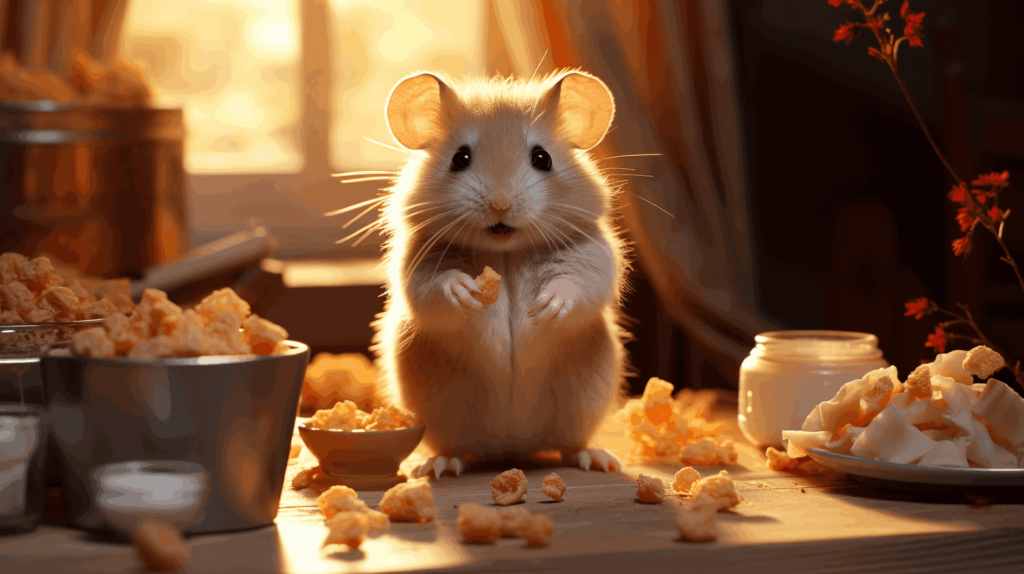In a world filled with tempting snacks, the question arises: can ferrets indulge in the irresistible delight of popcorn? While imagining these carnivorous creatures nibbling on fluffy kernels may seem amusing, their dietary needs must be prioritized.
With a fast metabolic rate and short digestive tract, ferrets require a diet rich in protein and fat. Unfortunately, popcorn offers little nutritional value.
Join us as we explore the truth behind this seemingly innocent snack and uncover healthier alternatives for our furry friends.
Key Takeaways
- As an occasional snack, ferrets can eat unsalted and unseasoned popcorn in small amounts.
- Popcorn with traces of unpopped kernels can cause digestive issues and intestinal obstruction in ferrets.
- Salted popcorn is poisonous to ferrets and can lead to severe health complications.
- Instead of popcorn, there are other safe and healthy treats for ferrets, such as lamb, turkey, cat treats, cooked egg, and chicken baby food.
Nutritional Requirements of Ferrets
Interestingly, the nutritional requirements of ferrets include a diet with at least 32% protein and 15-20% fat. As obligate carnivores, ferrets rely heavily on meat as their primary nutrition source. Their bodies are adapted to process and digest animal-based protein and fat efficiently.
Raw meat, such as chicken or turkey, is the best option for their diet, as it closely replicates their natural diet in the wild. Ferrets have a short digestive tract and a fast metabolic rate, so they should be fed small portions infrequently throughout the day.
It is crucial to provide a balanced diet to meet their nutritional needs to ensure their overall health and well-being.
Ferrets as Obligate Carnivores
Ferrets thrive on a diet that consists primarily of raw meat. They are biologically designed to metabolize and derive essential nutrients from animal-based protein and fat. Being obligate carnivores, their digestive system is optimized for processing and extracting nutrients from meat. Raw meat provides them with the necessary protein and fat content for their overall health and well-being.
It is important to note that a balanced diet for ferrets should contain at least 32% protein and 15-20% fat. While ferrets can eat other types of food as occasional treats, their primary diet should always be focused on raw meat. This ensures they receive the necessary nutrients to support their metabolism and maintain optimal health.
The Importance of Protein and Fat in a Ferret’s Diet
When considering the dietary needs of a ferret, it is crucial to recognize the significance of protein and fat in their diet. As obligate carnivores, ferrets require a diet high in animal-based protein and fat. Protein is essential for the growth, maintenance, and repair of body tissues, while fat provides energy and aids in the absorption of fat-soluble vitamins.
Ferrets have a fast metabolic rate and a short digestive tract, which means they require a diet that is rich in nutrients and easily digestible. Raw meat is the best option for providing the necessary protein and fat content in their diet, as it closely replicates their natural diet in the wild.
It is essential to ensure that the diet contains at least 32% protein and 15-20% fat to meet the nutritional needs of ferrets and maintain their overall health.
Raw Meat: The Best Option for Ferrets
Raw meat, as opposed to processed alternatives, provides the optimal source of nutrients for ferrets, ensuring their overall well-being and health.
- Raw meat replicates their natural diet in the wild.
- Ferrets require a diet with high protein and fat content.
- Raw meat provides the necessary nutrients for their fast metabolic rate.
- Feeding raw meat to ferrets helps maintain their short digestive tract.
Ferrets are obligate carnivores, meaning they thrive on a diet primarily composed of meat. Raw meat offers numerous benefits for their health and happiness. It closely resembles their natural diet in the wild, providing essential nutrients that processed alternatives may lack.
Ferrets have high protein and fat requirements, which raw meat fulfills perfectly. This ensures they have the energy they need and helps maintain their fast metabolic rate. Additionally, feeding raw meat helps keep their short digestive tract functioning optimally.
Understanding Ferret’s Digestive System
Due to their short digestive tract, ferret owners must understand how their digestive system functions to provide them with a balanced and appropriate diet. Ferrets are obligate carnivores, which means they primarily require meat in their diet to meet their nutritional needs. Their diet should contain at least 32% protein and 15-20% fat.
Raw meat is the best option for their diet, as it replicates their natural diet in the wild. Ferrets have a fast metabolic rate and a short digestive tract, which means they should be fed small portions infrequently.
It is important to avoid feeding them foods that can cause digestive issues, such as popcorn with traces of unpopped kernels or salted popcorn, which can be poisonous to ferrets. By understanding their digestive system, ferret owners can ensure that their furry friends receive the proper nutrition they need to stay healthy.
Harmful Effects of Unpopped Kernels in Popcorn
The ingestion of unpopped kernels in popcorn can lead to harmful digestive complications, such as intestinal obstruction, for both humans and animals.
- Unpopped kernels can cause damage to the digestive system when consumed.
- The hard texture of the kernels can lead to tooth damage and gum irritation.
- In some cases, the kernels can become lodged in the intestines, causing blockages.
- This can result in severe pain discomfort and potentially require surgical intervention.
It is important to exercise caution when consuming popcorn and ensure all kernels are fully popped before consumption. This is especially important for young children and pets, who may be more prone to accidental ingestion.
Dangers of Salted and Buttered Popcorn for Ferrets
An excessive amount of salted and buttered popcorn can pose significant health risks to ferrets, causing severe complications and negatively impacting their well-being.
Ferrets, being obligate carnivores, require a diet high in protein and fat, which they primarily obtain from consuming meat. Popcorn, especially when salted or buttered, does not provide the necessary nutrients for a ferret’s optimal health.
Additionally, salted popcorn is poisonous to ferrets and can lead to serious health complications. Buttered popcorn should also be avoided as adult ferrets are lactose intolerant, and dairy products can cause digestive issues.
It is important to prioritize a diet that meets the nutritional needs of ferrets, such as raw meat, instead of relying on popcorn or other unsuitable treats.
Why Caramel Popcorn Is Not Suitable for Ferrets
Consuming caramel popcorn can be detrimental to ferrets’ health due to its high refined sugar content, which is unsuitable for their dietary needs as obligate carnivores. Ferrets have specific nutritional requirements that should be met through a diet high in protein and fat.
Here are four reasons why caramel popcorn is not suitable for ferrets:
- Refined sugar can lead to long-term health complications in ferrets.
- Ferrets have a short digestive tract and fast metabolic rate, making it difficult for them to process high amounts of sugar.
- Caramel popcorn can cause weight gain and obesity in ferrets.
- Ferrets are prone to dental issues, and the sticky nature of caramel popcorn can contribute to dental problems.
It is important to prioritize a balanced diet for ferrets and to provide them with appropriate treats that meet their nutritional needs.
Healthy Alternatives to Popcorn for Ferrets
Healthy alternatives such as cooked turkey and cat treats are recommended for ferrets instead of popcorn. While popcorn can be given to ferrets as an occasional snack, it offers minimal nutritional value and can even be harmful if not prepared properly.
Ferrets are obligate carnivores and require a diet high in protein and fat. Raw meat, such as lamb or turkey, is the best option for their nutritional needs. Cat treats, cooked eggs, and chicken baby food are safe and healthy options for treating ferrets.
It is important to avoid giving ferrets popcorn that is salted, buttered, or caramel-coated, as these can lead to health complications. By providing a balanced diet and appropriate treats, ferret owners can ensure the overall health and well-being of their furry companions.
Strategies to Prevent Ferrets From Stealing Popcorn
Implementing effective prevention measures is crucial for curbing ferrets’ tendency to pilfer popcorn. To help you enjoy what is written, here are four strategies to prevent ferrets from stealing popcorn:
- Keep popcorn and other potentially toxic foods in locked cabinets to restrict access.
- Close doors and windows to limit your ferret’s access to the kitchen and dining area.
- Provide enough toys to keep them busy and well-supervised during playtime to distract them from stealing popcorn.
- Consider offering healthy and safe alternatives to popcorn, such as lamb, turkey, cat treats, cooked egg, or chicken baby food.
Conclusion
In conclusion, while ferrets can tolerate small amounts of unsalted and unseasoned popcorn as an occasional snack, it provides minimal nutritional value. It is crucial to prioritize a diet high in protein and fat for optimal health.
Popcorn with unpopped kernels, salted popcorn, and buttered popcorn should be avoided due to potential digestive issues and toxicity. Instead, providing alternative treats such as raw meat, cat treats, and cooked egg is recommended. To prevent ferrets from stealing popcorn, proper storage and providing ample toys are important.
One interesting statistic is that ferrets have a fast metabolic rate and a short digestive tract, requiring small portions of food infrequently.


